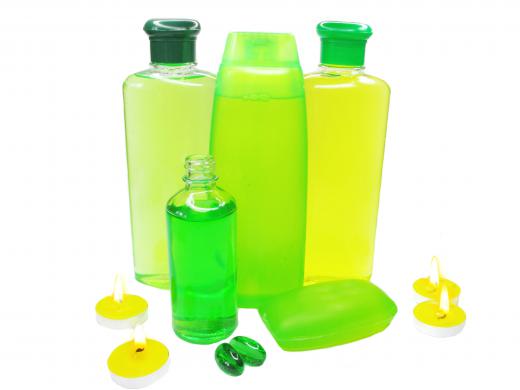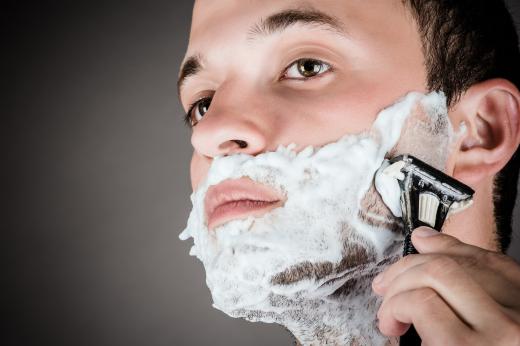What are the Different Uses of Liquid Glycerin?
Liquid glycerin a compound that is widely used in food preservation, skin care products, and various medicines due to its unique physical and chemical properties. The organic compound is derived from animal fats, plants, biodiesel fuels, and several different types of cooking oils. It is water-soluble and hygroscopic, meaning it can easily absorb liquid water or vapor from its surrounding environment. Since it is so effective at maintaining desired moisture content, glycerin can be used in food recipes, lotions, and industrial lubricants. It is also an essential component in many cough syrups, laxatives, hair products, and soaps, among many other commercial products.
In its normal state, liquid glycerin is a colorless, sweet gel. It is commonly used in food laboratories and kitchens as a type of sweetener or preservative. Some cooks and consumers use it as a substitute for table sugar, as it is nearly as sweet as sucrose with fewer calories per serving. Since it's hygroscopic, it helps to preserve moisture in a number of different food products, including cake icing and candy. The compound is also an effective fruit preservative, as it prevents excess water from escaping from fruit through evaporation.

Glycerin's ability to absorb and hold moisture makes it perfect for use in many beauty products. It can leave skin dry and irritated in its natural state, but it helps to keep skin soft and healthy when diluted with water and other chemicals. Many soaps, hair gels, facial scrubs, lotions, and shaving creams are made with glycerin. Shampoos and conditioners also commonly contain the substance, as do toothpastes and liquid mouthwashes.

Several health products use liquid glycerin for its natural antiseptic and lubricating qualities. It is especially useful in cough syrups and expectorants to help soothe sore throats. Many oral gel tablets are made partially of glycerin, as it makes pills easy to swallow and allows medicine to be released quickly. When used as a suppository, it can provide lubrication to dry membranes and act as a laxative by irritating the colon, encouraging bowel movements.

Glycerin has many important industrial applications as well. Many manufacturing plants and trucking companies rely on it as a standalone lubricant for hydraulic parts and mechanical gears. It is also used in the production of watercolor paints, printing inks, and cosmetics. In addition, some alternative energy companies use this valuable chemical compound in producing hydrogen fuel and ethanol.
AS FEATURED ON:
AS FEATURED ON:
















Discussion Comments
The article mentioned glycerine used as a mechanical gear lubricant. I'm interested to follow the references.
If glycerin is in biodiesel fuels, then I'm all for it! I came here to read up on the substance after looking at the ingredients list on my shampoo and finding myself wondering, "What is glycerin, anyway?"
Now I know...and if it's environmentally friendly, then I'm really glad it's out there! We need more fuels and useful substances that are byproducts of vegetable fuels and such and less that are produced using fossil fuels and plastic.
Hey, does anybody know if liquid glycerine spikes the insulin when you eat it? I know that glycerine is sweet, and lower in calories than sucrose (a.k.a. sugar), but that doesn't guarantee that it doesn't spike the insulin.
If it counts as a low-calorie sweetener that doesn't spike the insulin, I might just start using glycerine as a sweetener in my cooking.
My husband is diabetic, and I always have to be careful with what I serve him to eat. We always have to be sure of exactly how many carbohydrates are in a meal, and how much sugar, so that he can calculate his shots to match. It's a bit nerve-wracking, and a sweetener that doesn't spike the insulin would definitely simplify things a lot.
Does anybody know if it's okay to use as a sweetener in at-home cooking rather than just commercial? If so, how do you prepare it -- dilute it or leave it full strength? Liquid or some other form?
@Malka - E-liquid is made of glycerin, huh? So the same stuff in my cupcake icing is also in my toothpaste, my shampoo, and potentially in my cigarettes if I was a smoker (vaper? I heard they call e-smokers vapers). On top of that, it can be a laxative and it's in suppositories? Well, that's not very appetizing!
My personal favorite use for glycerin is in home made glycerin soap. You can make your own bars for very cheap, and you add essential oils to make it scented however you want. It's a fun hobby to make these soap bars, and actually my friends "borrowed" so many that now I make them for them as well.
Bar soap made with glycerin requires solid glycerin, but I've dabbled recently in making pump hand soap using liquid glycerin, and it works nicely. Glycerin definitely does leave hands feeling smooth if you dilute it with water.
Does anybody know if there is any truth in glycerin being harmful to the teeth? My brother said he read all about glycerin content in toothpaste leaving a coating on the teeth and preventing them from re-enamalizing, and I'm concerned that there might be some truth to this. I checked my toothpaste, and there is indeed glycerin in it. Is that bad?
Liquid vegetable glycerin is the base substance for the "e-liquid" that goes inside the cartridges of electronic cigarettes. I myself have used it, and I must say, mixing up your own is exactly the same as buying it, but at a fraction of the price.
Glycerin is important for electronic cigarette liquid because it is the part that makes the cloudy "smoke" effect with vapor. E-liquid is made of a very simple mix of water, liquid glycerin, flavoring and nicotine.
If you buy each of these ingredients individually, you can mix up your own e-liquid in any flavor that you like and fill the cartridges by hand at home easily. There are tutorials online about how to do it if anybody's curious how.
Post your comments